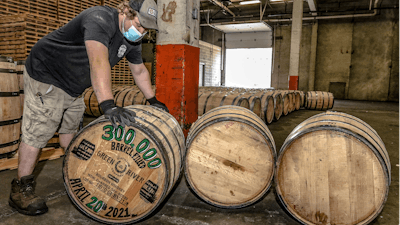
FRANKFORT, Ky. (AP) — Proposed tax relief for Kentucky's bourbon makers was fast-tracked Monday in advancing in the state House, but local leaders living near some of the world's best-known distilleries were in no mood to toast the industry victory.
The measure aims to phase out a property tax on the value of stored bourbon barrels — a top industry priority. The phaseout would begin in 2026 and be completed by 2039.
House Bill 5 cleared the House on a 59-40 vote, soon after emerging from committee. With only a few days left in this year's 30-day legislative session, the proposal advances to the Senate, where Republicans also have a supermajority.
The barrel tax — assessed only in Kentucky — hurts the state's competitiveness and threatens to chip away at the state's status as the bourbon industry epicenter, the bill's supporters said.
"No other manufacturer pays taxes on its goods during production," said Eric Gregory, president of the the Kentucky Distillers' Association. "Taxes aren't levied on vehicles rolling down the assembly line, dishwashers as they are being built, or tobacco drying in the barn."
Leaders from some of the top bourbon-producing counties, however, worry that the inventory tax phaseout will take away an important revenue source for local governments.
"We need the money to survive or we're going to have to cut services," Nelson County Judge-Executive Timothy Hutchins told a House committee earlier Monday.
Kentucky produces 95% of the world's bourbon and is home to nearly 10 million barrels of aging spirits, according to the Kentucky Distillers' Association.
The bill's leading supporters include House Speaker David Osborne, who warned that "it is not our right to be home to the bourbon industry." Several other states have surpassed Kentucky in total number of distilleries, though Kentucky is home to the largest production plants.
"Kentucky taxes alcohol more than any other state in the country," Osborne said.
The barrel tax is a barrier to bourbon production startups in Kentucky, and it's a disincentive to store bourbon in the Bluegrass State, the speaker said. Gradually removing the tax will help "cement ourselves as the bourbon capital of the world," he said.
If the revenue raised from barrel taxes gradually gets smaller, the side effects from distilling operations will remain — wear and tear on roads and the ,spread of whiskey fungus, local leaders told lawmakers. The fungus is a black mold-like growth that feeds off the "angel's share" — the distilling industry term for the alcohol that evaporates from the wooden barrels.
In the past, when distillers asked local leaders for approval of their expansions, the producers touted the benefits to local governments from the barrel tax, they said.
"I'm here today asking you to honor our handshake with the bourbon industry," said Josh Ballard, a city council member in Loretto, home of the Maker's Mark distillery.
The phaseout includes efforts to create revenue sources to offset losses for the affected local governments, the bill's supporters said. It includes "hold harmless" provisions for public school districts in bourbon-production counties. City and county governments could assess a license fee on distilleries to offset future revenue reductions.
Those protections weren't enough to satisfy some lawmakers from bourbon-production counties who worried about the potential revenue losses.
"I'm all for cutting taxes. But I'm not for cutting taxes on a booming industry that's going to place the burden on the backs of my constituents," said Republican Rep. Candy Massaroni.






















